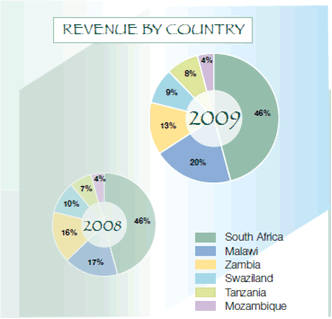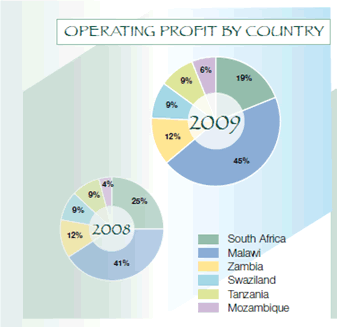 Illovo Sugar (Malawi) Ltd
Illovo Sugar (Malawi) Ltd
All data are collected in the Fiscal Year of 2008-2009.
Company Profile and History
Illovo Sugar is a leading, global, low-cost sugar producer and a significant manufacturer of high-value downstream products. The group is Africa’s biggest sugar producer and has extensive agricultural and manufacturing operations in six African countries.
Illovo sugar has its origins in 1891 when Reynolds Brothers Limited was listed as a public company and Charles George Smith was appointed as its agent in Durban. In 1904 Smith and associates bought the Umzimkulu mill and estates and in 1915 Natal Cane By-Products Limited (now Illovo Merebank) was listed as a public company.
In 1975 the sugar-related assets of CG Smith & Company Limited, together with the Gledhow Sugar Company Limited, were amalgamated with Reynolds Brothers into a single new entity under the name of CG Smith Sugar Limited (“CG Smith Sugar”) and in 1977 CG Smith Sugar acquires the Illovo and Noodsberg sugar mills and estates from Tate & Lyle plc. In 1994 the company name was changed to Illovo Sugar Limited to identify with the Illovo brand of sugars and syrups.
In 1997 Illovo acquired Lonrho Sugar Corporation Limited, with sugar assets in Malawi, Swaziland, Mauritius and South Africa and in 2006 Associated British Foods plc, a company listed on the London Stock Exchange, acquired a 51 percent controlling stake in Illovo.
Illovo Sugar (Malawi) Ltd is Malawi’s only Sugar producer with agricultural and milling assets at the Nchalo Sugar Estate located 80kms south of Blantyre in the southeast of the country and at the Dwangwa Sugar Estate located 306kms north of Lilongwe on the Northern Lake shore in the mid-central region.
Illovo Sugar (Malawi) Ltd has a network of distributor depots that sell sugar at factory price through-out the country. The company pays for the transportation of sugar from the estates to all the depots and, in this regard, ensures a national or depot-delivered price of sugar across the country.
In Country Location
Churchill Road, Limbe, Malawi, Telephone Number: + 265 1 843 988; Mobile Number: + 265 9 969 995; Fax Number: + 265 1 840 761
Services and Products
Refined Sugar, Sugar Syrup, Cane Sugar, Speciality Sugar (for export market). Speciality sugars made in Malawi and Zambia are produced for preferential markets in the EU and in the case of Malawi also in the US.
The core business functions of Illovo Malawi are: growing cane, manufacturing sugar, and marketing and distributing sugar.
Number of Employees
5,500 permanent employees and 4 600 seasonal workers
Financial Information
Sugar production in 2008/09 amounted to 1,8 million tons, comprising 920 000 tons produced in South Africa, Malawi 304 000 tons, Zambia 193 000 tons, Swaziland 210 000 tons, Tanzania 118 000 tons and Mozambique 76 000 tons. Sugar cane production (‘000 tons)-Malawi: 2 122
The contributions to operating profit were: South Africa 19 percent, Malawi 45 percent, Zambia 12 percent, Swaziland 9 percent, Tanzania 9 percent and Mozambique 6 percent.
Company Results
| Results (Rm) | 2009 | 2008 | Change |
|---|---|---|---|
| Revenue | 8 601.7 | 6 794.1 | 27 |
| Operating profit | 1 386.2 | 1 064.5 | 30 |
| Net financing costs | 183.7 | 170.4 | 8 |
| Headline earnings | 741.8 | 599.6 | 24 |
ILLOVO Sugar (Malawi)-half year results to 30 September 2008
Profit after tax was MK3, 036 against MK2, 439 made the similar period in 2007 representing a 24.5 percent increase.

Market Share
In Malawi, Illovo is the country’s sole sugar producer. Illovo/SUCUMA owns two production estates and factory operations (mills and refineries) at Nchalo and Dwangwa. These two operations account for 100 percent of Malawi’s milling and refining capacity. Domestic sales comprised approximately 67 percent of total sales in 2008/09.
Business Objective
“To be the leading sugar and downstream products operation in Africa, an increasing global player and a world class organization; and be the lowest-cost producer in every country in which it operates and among the lowest-cost producers in the world”
Business Model
“To achieve the group’s goals and objectives, progress towards achieving these targets is monitored on a regular basis through performance reviews and strategic assessments, which take account of ongoing developments both within and outside of the organisation. Interventions are made through the processes of medium-term strategic planning and annual budgeting for capital and operating expenditure.
The group’s primary objectives of enhancing shareholder wealth, being world-class and an efficient, low cost producer, whilst achieving a balanced and integrated economic, social and environmental performance, have largely been achieved over the past five years. Production growth has been significant since the group first embarked on its expansion outside South Africa and strong cash flows have been maintained enabling dividends to be paid consistently, twice covered by annual earnings.
Benchmarking techniques to measure and implement best practice methods, as well as in house technical expertise, are used to optimise returns on installed capacity. Risk management is also an integral part of Illovo’s business. The NOSA Integrated Five Star System covering safety, health and environmental management is implemented at all the cane growing and factory operations.
In order to meet the ongoing financial requirements of the group, existing facilities have been renewed. In addition it is intended that a rights issue be undertaken by the company to raise fresh capital to provide for current and longer term growth plans.
It is the mission of Illovo Sugar (Malawi) Ltd to (a) be the leading sugar producer by efficiently developing material niche operations that add value to its core business and (b) remain competitive in all its markets by proactively anticipating customer needs with a view to maintaining and enhancing market shares. “
Ownership of Business
Illovo Sugar is a subsidiary of Associated British Foods plc which holds 51 percent of the issued share capital. Illovo acquired a controlling 60 percent share in the previously state-owned Sugar Corporation of Malawi (SUCOMA) in 1998 from Lonrho PLC and increased its stake to 76 percent in 2005.
Benefits Offered and Relations with Government
Taxation
Corporation tax rate is currently at 38 percent; for companies registered outside Malawi but operating as branches in Malawi, the tax rate is 43 percent; remittance of dividends outside Malawi is now tax free effective 1 April 1995; no withholding tax is applicable on dividend income; capital allowances for new and used fixed assets i.e. buildings, machinery, motor vehicles etc are granted. Effective 1 July 1998, no initial allowances are granted on motor vehicles considered to be Saloons, 4x4 Double Cabins, Pajeros etc.; individuals are taxable on varying tax bands
Incentives
Incentives include: 40 percent investment allowance on qualifying expenditures for new building and machinery used in the trade; an additional 15 percent allowance for investments in a designated area of the country; up to 20 percent allowance for qualifying training costs; allowance for manufacturing companies to deduct all operating expenses incurred up to 18 months prior to the start of an operation; indefinite loss carries forward to enable companies to take full advantage of their tax losses; agreements for the avoidance of double taxation; agreements for reduction of withholding taxes on remittances and payments; deferred duties on machinery and equipment for up to two years; full rebate of duties on heavy commercial vehicles.
In addition to the general incentives, there are also some special incentives for export-related companies: export tax allowance amounting to 12 percent of export revenues for non-traditional exports, excluding traditional exports other than tobacco, tea, sugar and coffee; transport tax allowance amounting to 25 percent of international transport costs incurred for non-traditional exports other than tobacco, tea, sugar and coffee; no duties on imports of capital equipment used mainly in the manufacture of exports for those manufacturing in bond; no surtaxes (VAT); no excise taxes on purchases of raw materials and packaging materials made in Malawi for those manufacturing in bond; timely refund of all duties (duty drawback) on imports of raw materials and packaging materials for those manufacturing in bond.
Although most prices are determined in the market, the government influences certain prices through state-owned enterprises and utilities, such as electricity, transportation, water, and telecommunications; controls the prices of petroleum products and sugar; and uses subsidies to stabilize maize and fertilizer prices.
Product Development
Both Nchalo and Dwangwa have been the focus of various agricultural and milling capacity expansion projects. At Dwangwa, factory capacity was increased by 15 percent and new areas of company and outgrower land continued to be developed to cane, through which cane supplies to the Dwangwa mill will increase by about 110 000 tons per annum. At Nchalo, 720 hectares of new land were developed to cane in 2008 and a further 480 hectares will be developed. Factory capacity at Nchalo was increased during the past off crop period by 10 percent in order to accommodate the increase in future cane supply. The production of cane by Malawian local indigenous farmers continues to gain momentum and areas being farmed by out growers at both Nchalo and Dwangwa are expanding. The Kasinthula small-grower scheme, which currently supplies cane to the Nchalo mill, became the beneficiary of a wide-ranging support package from the EU, including the provision of management services and financial backing for an expansion of this scheme by a further 500 hectares. The African Development Bank remains a major concessional funder and supporter of out grower initiatives at Dwangwa.




